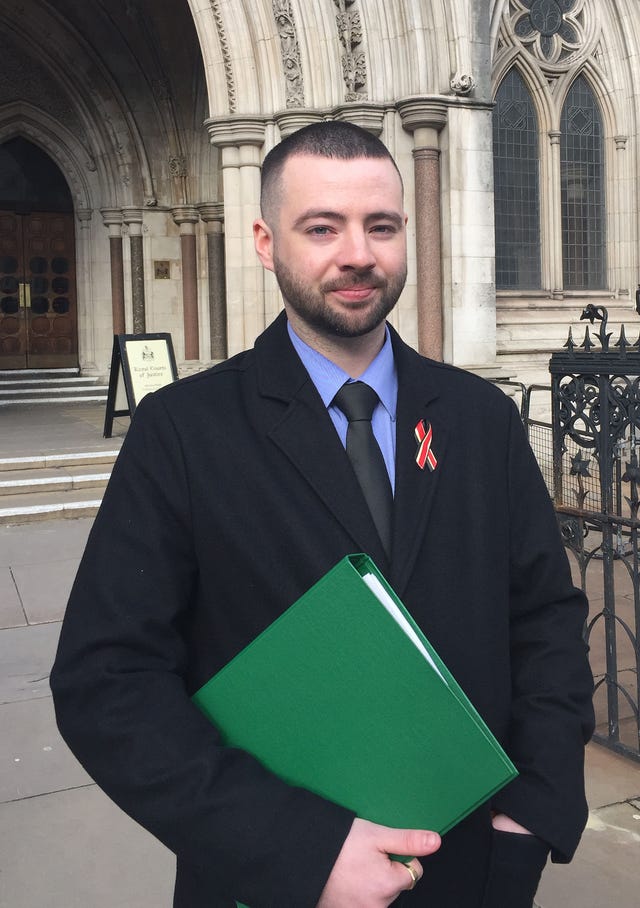Bereaved families who lost loved ones in the contaminated blood scandal have claimed their relatives were being “used for research” after discovering historic notes in medical records.
It is claimed that some patients being treated for the blood clotting disorder haemophilia in the 1970s and 1980s were given blood plasma treatment which doctors knew might be contaminated and infect them with hepatitis.
They wanted to study the links between the haemophilia treatment Factor VIII and the risk of infection, but a number of families have claimed their loved ones were enrolled in these studies without their knowledge or consent.
The Factor 8 campaign group alleges that instead of stopping treatment, clinicians lobbied to continue trials, even after identifying the association between hepatitis and the treatment.

He has since found other families who have discovered the same notes in the records of their loved ones.
Mr Evans, whose father died in 1993 after being infected with both HIV and hepatitis C during the course of his treatment for haemophilia, told the PA news agency: “It is appalling that hundreds of people with haemophilia across the country were knowingly infected with lethal viruses under the guise of scientific research.
“These secret experiments, conducted without consent, show individuals were treated as mere test subjects, not human beings.
“The fact that this could happen on such a scale, over such a long period of time, is almost incomprehensible.”
According to medical regulators, seeking consent is “fundamental in research involving people”, but families have said that neither they nor their loved ones gave consent to take part in any such trials.

The documents suggest that patients were monitored from afar for around a decade.
Hundreds of patients were involved in the trials, but it is not clear whether they gave their consent.
Becka Pagliaro from Waterlooville, near Portsmouth, said she was “shocked” to find notes about the trials in her father’s patient notes.
Her father Neil King was co-infected with both HIV and hepatitis C while receiving treatment for haemophilia. He died in 1996 when he was 38 years old.
“When I got his medical records I saw he was part of this research which I know it was something that he would not have agreed to, so that was done covertly,” Ms Pagliaro told PA.
“I was really shocked – I wondered first of all whether I had received someone else’s medical records because I could not believe what I was seeing.”

“When I saw the research was on my brother’s records I thought: ‘What’s this?’ And after asking a few questions I didn’t get anywhere,” said the 59-year-old from Warwickshire.
“It was only the last few months that it really came to light – they were being used for research.”
Emma Frame, from South Shields, said that her father had never agreed to be part of studies but found multiple references to them in his medical records.
Ms Frame told PA: “I have all of his records which is where I came across these studies.
“There is no information other than this doctor’s name, a treatment and then a date. With my dad it was recorded several different times.
“It’s absolutely mind-blowing the information that is out there that has been hidden.”
Jeffrey Frame was co-infected with HIV and hepatitis C and died in 1991 when he was just 39.
Ms Frame said that in the mid 1990s she also discovered that the NHS had kept some of her father’s “samples”, which had not been discussed with the family.
“They still had actual physical samples of my dad who had died years previous,” she said.
Other families have also contacted Factor 8 after finding reference to the trials in their loved ones’ medical records.
It comes after it emerged that experiments were conducted on schoolboys with haemophilia without the knowledge or consent of their parents.
Until the 1970s the treatment for haemophilia required transfusions with plasma which had to be given in hospital.
This treatment was replaced with a new product, called a factor concentrate, which could be given at home as an injection.
Factor concentrate was produced by pooling human blood plasma samples and concentrating it.
But by pooling samples from up to tens of thousands of donors, the risk of contamination of viruses – including HIV and hepatitis – increased significantly.

The Infected Blood Inquiry will publish its final report on May 20.
Tens of thousands of people were infected with contaminated blood through infected blood products or blood transfusions, largely between the 1970s and 1980s – but some cases from the early 1990s have also been identified.
People were infected with hepatitis or HIV, and in some cases with both.
The Inquiry has announced the publication date for its Report.
For more information, and to find out how to register, see here: https://t.co/R8JPyN39c7
— Infected Blood Inquiry (@bloodinquiry) January 17, 2024
An estimated 3,000 people have died as a result, while those who survived have lived with life-long health implications.
Des Collins, senior partner of Collins Solicitors, which represents 1,500 victims and their families, added: “There is now overwhelming evidence that the NHS failed patients on a number of levels in the 70s and 80s and certainly in ways we find shocking and abhorrent.
“We are looking forward to Sir Brian Langstaff’s final Inquiry report in a few weeks’ time, which will lay out the wrongs perpetrated in comprehensive fashion.
“Not only will this reinforce the case for compensating victims and their families, but importantly will shine a light on the lessons to be learned so that mistakes of the past are never repeated again.”






